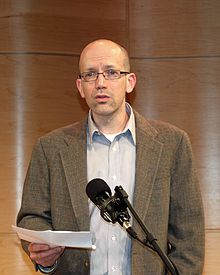Stephen Burt
| Stephen Burt | |
|---|---|

Burt announcing the 2010 National Book Critics Circle award finalists in criticism.
|
|
| Language | English |
| Nationality | American |
| Alma mater |
Harvard University; Yale University |
| Genre | Literary Criticism |
| Notable works |
Randall Jarrell and His Age; "The New Things"; "elliptical poetry" |
Stephen Burt is a literary critic, poet and a professor, who teaches at Harvard University. The New York Times has called him "one of the most influential poetry critics of his generation."
Burt received significant attention for coining the term "elliptical poetry" in a 1998 book review of Susan Wheeler's book Smokes in Boston Review magazine. This is how Burt defines the elliptical poet:
Elliptical poets try to manifest a person—who speaks the poem and reflects the poet—while using all the verbal gizmos developed over the last few decades to undermine the coherence of speaking selves. They are post-avant-gardist, or post-"postmodern": they have read (most of them) Stein's heirs, and the "language writers," and have chosen to do otherwise. Elliptical poems shift drastically between low (or slangy) and high (or naively "poetic") diction. Some are lists of phrases beginning "I am an X, I am a Y." Ellipticism's favorite established poets are Dickinson, Berryman, Ashbery, and/or Auden. . .The poets tell almost-stories, or almost-obscured ones. They are sardonic, angered, defensively difficult, or desperate; they want to entertain as thoroughly as, but not to resemble, television.
Burt also adds that Elliptical poets are "good at describing information overload." In addition to calling the subject of Burt's review, Susan Wheeler, an important elliptical poet, Burt also lists Liam Rector's The Sorrow of Architecture (1984), Lucie Brock-Broido's The Master Letters (1995), Mark Ford's Landlocked (1992), and Mark Levine's debut, Debt (1993) as "some groundbreaking and definitively Elliptical books."
In 2009, Burt wrote an essay called "The New Things" in which he invented a new category of American contemporary poets, which he calls "The New Thing." Burt explains that these poets derive their new style from the likes of William Carlos Williams, Robert Creeley, Gertrude Stein and George Oppen. This is how Burt loosely defines "The New Thing" poets:
...
Wikipedia
